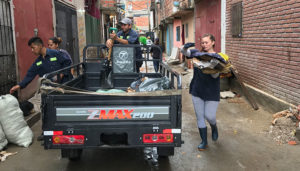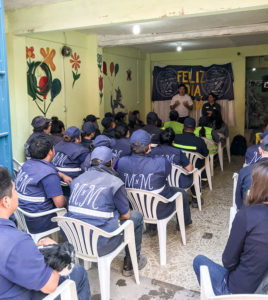Alongside the work we recently launched in Indonesia, we’re also kicking off efforts in Argentina to develop and test solutions that will put all waste to productive use for the benefit of communities and the environment.
“Latin America is an important region for McKinsey.org to work in and learn from,” says Shannon Bouton, Global Executive Director of Sustainable Communities at McKinsey.org. “Waste pickers here have organized into labor cooperatives that now play an official, vital role in the recycling value chain. This is very much in line with our approach of building on the knowledge and entrepreneurial spirit of recycling workers, especially those with roots in the informal sector.”

Our initial focus in Argentina is Barrio 31, an iconic informal settlement of about 40,000 people in the heart of Buenos Aires. Like many other informal settlements around the world, it’s struggling with waste management. McKinsey.org, together with our partners, is trying to demonstrate that a community-scale solution for recycling in Barrio 31 can be economically beneficial, as well as environmentally and socially responsible. We hope solutions developed here can be scaled across the City of Buenos Aires and beyond.
The city is three years into an ambitious effort to transform the settlement, keeping the community in place while providing quality housing, formal infrastructure and services, and drawing businesses and city attractions that complement the Barrio’s cultural vibrancy.
“Our partnership with McKinsey.org is an exciting step forward in our dream to transform Barrio 31 into the most sustainable, vibrant neighborhood in the city,” says Diego Fernandez, Secretary of the Social and Urban Integration Secretariat of the City of Buenos Aires. “Instead of sending the Barrio’s waste to landfills or allowing it to pollute our environment, causing health and safety issues for our families and children, we will harness the value in the waste for the benefit of the community.

“We can create new recycling enterprises and build a beautiful, clean neighborhood that is a source of pride and an attraction for visitors,” Diego continues. “And we will showcase how engaging our neighbors and waste workers as true co-creators can produce the most creative, enduring solutions.”
In Buenos Aires we’re delighted to be partnering with Almado, an Argentina-based consultancy focused on social impact and a social enterprise.
“We look for solutions that deliver economic, social and environmental return on investment,” explains Alejandro Preusche, Managing Director of Almado. “We’re pleased to be able to bring our experience and relationships, both from working with informal settlement communities as well as with the private sector and impact investors, to this collaboration.”
Alejandro continues: “We hear from residents of Barrio 31 that they worry about their children playing in and around waste in the streets and they see the regular collection service as vital to the quality of their daily lives. “Our hope is that McKinsey.org’s holistic approach to recycling can make a real difference here in Argentina.”
Working together, McKinsey.org, Almado and the City of Buenos Aires have launched a 400-household pilot in Barrio 31, which is educating residents on recycling both dry and organic waste. “Early results are promising,” says Lucas Gastaldi Asensio, Regional Manager of McKinsey.org for Latin America. “In the pilot area, 15 percent of total waste is already being diverted from landfills after just a couple of weeks—comparable to many communities in the United States. Our goal is to achieve 70 percent diversion from landfills.”
Lucas adds: “In close collaboration with city officials, two local cooperatives have quickly set up an efficient processing facility in the Barrio—and they are already collecting and selling recyclables. The change is attracting attention across the Barrio, with other cooperatives coming forward and asking to join the program.”
The initial results of our pilot show that rapid progress is possible in putting recycling at the heart of the social and economic life of communities such as Barrio 31. Our hope is that by collaborating with other cooperatives, city governments, and social enterprises, we can quickly scale solutions across and beyond Argentina.
